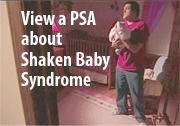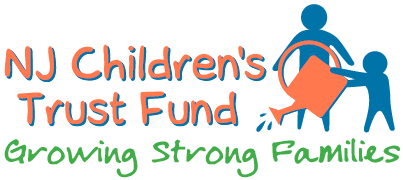BABIES ARE FRAGILE!
It's normal for babies to cry, even when you are trying to comfort them. Some babies cry more than others or for longer periods of time. This is normal too. It is also normal for a caregiver to become frustrated. No matter how stressed, tired, angry or frustrated you feel, you must never, ever shake a baby. Shaking a baby can kill or cause serious injuries.
The message is simple:
NEVER SHAKE A BABY
- Make sure the baby’s basic needs (food, diapering, appropriate clothing, etc.) are met.
- Try swaddling, tightly wrapping your baby in a blanket for warmth and security.
- Offer the baby a pacifier.
- Lower the lights and noise to help calm the baby.
- Walk the baby around holding him or her close to you.
- Take the baby for a ride in a stroller or a car.
- Call a friend, relative, neighbor or medical provider for help.
- Take a break - sit down and count to 10 or 20.
- If all else fails, put the baby in the crib on his or her back. Close the door and check back every five minutes or so. Don’t pick up the baby until you feel calm.
If you are a child care provider and cannot handle a crying baby, please let the parent know.
Remember, a baby will outgrow crying, but shaking a baby may cause permanent damage.
Shaken Baby Syndrome is a serious brain injury that occurs when a frustrated caregiver “shakes” an infant, usually to stop him/her from crying. It is considered a form of child abuse.
Some parents, siblings, or caretakers who would not consider hitting a baby, think that shaking a baby is okay. THIS IS DANGEROUS!
Shaking a baby can cause bleeding inside the brain which may lead to:
- Death
- Brain damage
- Retardation
- Blindness
- Paralysis
- Seizures
- Developmental delays
Protect our future by handling infants with the loving care they deserve!
And remember, some play activities also can be dangerous, such as:
- Vigorous, repeated tossing of a baby into the air
- Jogging while carrying an infant on the back or shoulders
- Bouncing an infant on an adult’s knee or swinging the baby on an adult’s leg
- Swinging the baby around by the ankles
- Spinning an infant around
- Constant crying
- Stiffness
- Sleeping more than usual
- Unable to wake up
- Seizures
- Dilated pupils
- Decreased appetite
- Vomiting
- Difficulty breathing
- Blood spots in eyes
If for any reason the baby has an injury, take him/her to the nearest hospital emergency room or call 911. The baby will not get better without receiving medical treatment.
IF YOU FEEL THAT YOU CAN'T COPE, HELP IS ONLY A TELEPHONE CALL AWAY.
If you are feeling stressed, call the Family Helpline:
1 800-THE KIDS
24 hours a day, 7 days a week









